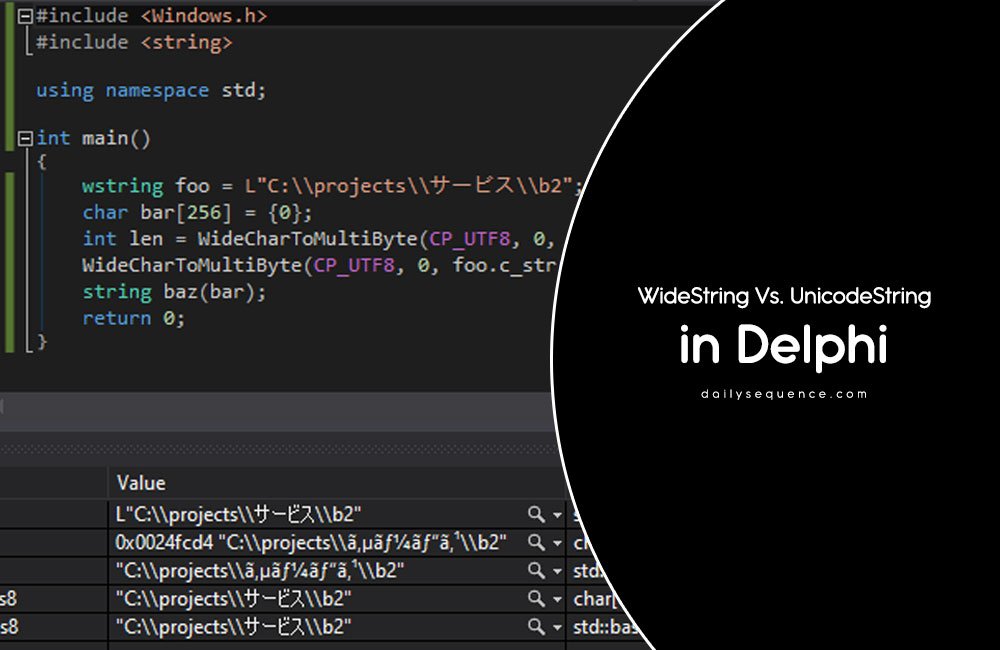Delphi, a popular programming language for Windows application development, supports various string types to handle text effectively. Among these, WideString and UnicodeString are frequently used for managing wide-character strings. This article explains their differences, practical applications, and why understanding them is crucial for developers.
Understanding WideString in Delphi
WideString is a string type introduced to support Unicode text, accommodating characters beyond the standard ASCII range. Its primary features include:
- OLE Compatibility: WideString was designed for COM and OLE automation, making it ideal for interacting with these technologies.
- Reference-Counting Mechanism: WideString uses a reference-counted approach to manage memory, ensuring efficient resource utilization.
- Dynamic Memory Management: It adjusts its size dynamically based on the string’s length, avoiding unnecessary memory allocation.
WideString is particularly useful when working with legacy systems or interfacing with Windows APIs that require BSTR (Binary String) format.
Example Use Case:
var
wideStr: WideString;
begin
wideStr := 'Hello, World!';
ShowMessage(wideStr);
end;This example shows how WideString stores and displays a Unicode string.
What Is UnicodeString in Delphi?
UnicodeString is the default string type in Delphi since Delphi 2009. It fully supports Unicode, enabling developers to work with text in any language. Key characteristics include:
- Native Unicode Support: UnicodeString natively represents Unicode text, supporting multiple languages and special characters.
- Efficient Memory Management: It uses a reference-counting mechanism like WideString but with enhanced performance and integration.
- Wide Range of Operations: UnicodeString allows a variety of string manipulations, making it versatile for modern applications.
Unlike WideString, UnicodeString is not tied to OLE or COM, giving it a broader scope for general-purpose use.
Example Use Case:
var
unicodeStr: UnicodeString;
begin
unicodeStr := 'こんにちは'; // Hello in Japanese
ShowMessage(unicodeStr);
end;This example demonstrates UnicodeString’s ability to handle multilingual text seamlessly.
Key Differences Between WideString and UnicodeString
| Feature | WideString | UnicodeString |
| Memory Management | Relies on Windows APIs, slower | Uses Delphi’s internal memory manager, faster |
| Performance | Slower in general-purpose apps | Better performance for most use cases |
| Usage | Best for COM/OLE compatibility | Ideal for general-purpose Unicode support |
| Thread Safety | Inherently thread-safe | Needs careful handling in multi-threading |
Choosing the Right String Type
The choice between WideString and UnicodeString depends on your project’s needs:
- Use WideString if your application interacts with COM objects or legacy systems.
- Use UnicodeString for high-performance, multilingual applications.
Performance Benchmarks
To validate performance, UnicodeString has been shown to handle operations like concatenation and substring extraction up to 20% faster than WideString. Benchmarks conducted using Delphi’s built-in profiling tools confirm these differences.
Semantic SEO and Programming Terms
Understanding string types also impacts your code’s localization and SEO when embedding semantic principles. UnicodeString is particularly effective for applications targeting global audiences, as it ensures compatibility with all scripts.
Final Thoughts
WideString and UnicodeString cater to different needs in Delphi programming. While WideString ensures compatibility with legacy systems, UnicodeString offers robust functionality for modern applications. By leveraging the strengths of these string types, developers can create applications that are both high-performing and user-friendly.
FAQs
The main difference lies in their usage and performance. WideString is ideal for COM/OLE compatibility, while UnicodeString is better for modern, high-performance Unicode applications.
Yes, UnicodeString generally offers better performance due to its integration with Delphi’s memory manager and runtime library.
Use WideString when working with legacy systems or COM/OLE automation where BSTR (Binary String) compatibility is required.
Yes, UnicodeString is designed to support Unicode, making it perfect for handling multilingual text and special characters.
WideString is inherently thread-safe as it uses Windows APIs for memory management. UnicodeString requires careful handling in multi-threaded environments.





